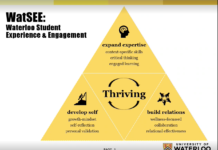With surprising success, Canadian researchers have created a college rape prevention program that appears to lower sexual assault rates. This experimental program was tested on first-year female students at universities in Calgary, Windsor, and Guelph and introduced them to specialized training.</p>
The course taught them how to recognize potentially dangerous situations as well as how to state and uphold personal boundaries in four three-hour sessions. This sessions included discussions and role-playing hazardous situations, as well as how to problem solve when such a situation unfortunately arises.
“This won’t stop the problem, but it’s an important piece that has been overlooked,” said Sarah E. Ullman, professor of criminology, law, and justice at the University of Illinois in Chicago when commenting on the positive results from the program.
The risk of female students being sexually assaulted within the 451 participants fell to five per cent — a huge success when compared with 442 students who were only given brochures and a brief info session and suffered a rate of sexual assault of 10 per cent.
“Only 22 women would need to take the program in order to prevent one additional rape from occurring within one year,” concluded Charlene Y. Senn, the lead author of the study. The study also found that the risk of attempted rape was also lowered from 9.3 percent to 3.4 percent.
With such positivity and praise surrounding this study as well as sexual assault continuing to be an issue on university campuses, introducing such a program could be very beneficial for student safety.
Mahejabeen Ebrahim, UW’s director of equity, noted in a statement that “prevention-related education and training is a key area of focus of the Working Group on Awareness and Prevention of Sexual Violence,” and the group has been examining the value of such educational training sessions to see just how this program could fit into UW. A specialized program “will be given serious consideration as we enhance our current program on prevention-related education and training for students, faculty, and staff. This work will be done in consultation with members of the campus community.”
The UW’s Women’s Center declined to comment specifically on the study, instead releasing a statement in which they said that, “we believe that sexual assault is a problem on all post-secondary campuses.” The group is also committed to making the university “a safe space for people of all genders.”
The program focuses on women, something Dr. Shannon Dea, a member of the women's studies faculty at UW, believes is a problem. “It’s unjust that fighting sexual assault is so often cast as woman’s work,” stated Dea. “We should all — both men and women — be working together on this.”
The study also found that many participants were ill-informed about the realities of sexual assault before attending training.
“Many of the subjects were really ignorant about acquaintance assault prior to training,” Dea explained when talking about the training participants received. “They mistakenly thought of stranger assault as the typical kind of sexual assault, so they were afraid of the wrong people and they were afraid in the wrong contexts.”
This fact came out during the study as Lindsey Boyes, a student at the University of Calgary, had been able to come to the conclusion that she had been sexually assaulted in high school when intoxicated at a party. When a person is debilitated by drugs or alcohol, they cannot give legal consent, which is why acquaintance and romantic partner rape is much more common.
Dea continued to explain that these results show just how much young individuals of all sex and genders are confused with what exactly sexual assault is and are more likely to have a “blurred lines”-type of thinking. If this program were to ever come to the University of Waterloo, she suggested that these problems be addressed so that everyone on campus can have proper information and defensive strategies against this crime.






























